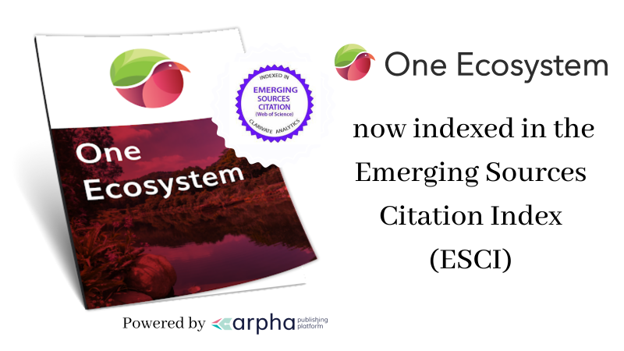Seven years after its official launch in May 2016, One Ecosystem – a scientific journal closely tied to the Ecosystem Service Partnership and its community since its very beginning – has successfully completed the rigorous quality and integrity assessment at Web of Science.
The news means that One Ecosystem might see its very first Journal Impact Factor (JIF) as early as 2024, following the latest revision of the metric’s policies Clarivate announced last July.
“We are happy to learn that Web of Science has recognised the value and integrity of One Ecosystem in the scholarly landscape. Not only does it mean that the scientific content One Ecosystem has been publishing over the years is persistent in merit and quality, but that innovative research outputs are already widely accepted and appreciated within academia. After all, one of the reasons why we launched One Ecosystem and why it has grown to be particularly distinguished in the field of ecology and sustainability is that it provides a scholarly publication venue for traditional research papers, as well as ‘unconventional’ scientific contributions,” comments Prof Dr Benjamin Burkhard, Executive Director at the Institute of Physical Geography & Landscape Ecology, Leibniz University Hannover (Germany) and founding Editor-in-Chief of One Ecosystem.

“These ‘unconventional’ research outputs – like software descriptions, ecosystem inventories, ecosystem service mappings and monitoring schema – do not normally see the light of day, let alone the formal publication and efficient visibility. We believe that these outputs can be very useful to researchers, as well as practitioners and public bodies in charge of, for example, setting up indicator frameworks for environmental reporting,” said Prof Davide Geneletti, Department of Civil, Environmental and Mechanical Engineeringof University of Trento, Italy.
“In fact, last year, we also launched a new article type: the Ecosystem Accounting table, which follows the standards set by the the System of Environmental-Economic Accounting Ecosystem Accounting (SEEA EA). This publication type provides scientists and statisticians with a platform to publish newly compiled accounting tables,” adds Dr Joachim Maes, Policy analyst at the Directorate-General for Regional and Urban Policy of the European Commission and Deputy Editor-in-Chief of One Ecosystem.
***
Previously, One Ecosystem has been accepted for indexing at over 60 major academic databases, including Scopus, DOAJ, Cabell’s Directory, CABI and ERIH PLUS. In June 2022, the journal received a Scopus CiteScore reading 7.0], which placed it in Q1 in five categories: Earth and Planetary Sciences; Ecology; Nature and Landscape Conservation; Agricultural and Biological Sciences (miscellaneous); Ecology, Evolution, Behavior and Systematics.
__________________________
You can follow One Ecosystem on Twitter and Facebook.
